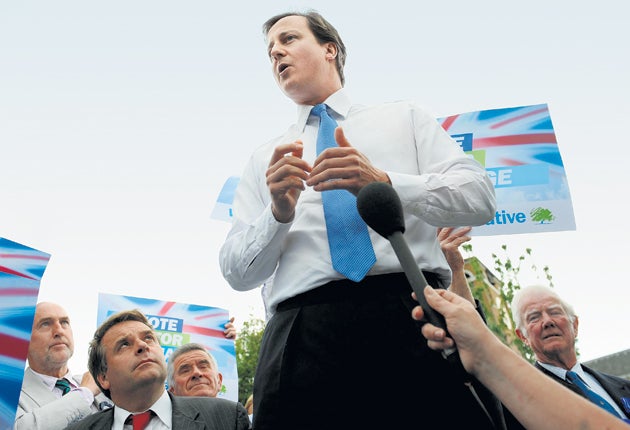Quangos 'to be more accountable' under Tories

A Conservative Government would make quangos more democratically accountable, David Cameron announced today as he unveiled a review of publicly-funded independent bodies to determine which should be scrapped or slimmed down.
Mr Cameron said that "in many cases" quangos were getting bigger and bigger and spending increasing amounts of money.
"There are some quangos that have a technical function, inspecting nuclear installations, or they have a transparency function, like the Office for National Statistics, but, in too many cases, these organisations have got bigger and bigger - they spend about £64 billion a year," he told BBC Breakfast.
"They start having their own communications departments, their own press officers, they start making policy rather than just delivering policy and their bosses are paid vast amounts of money."
He added that, for the top 20 quango chiefs, the average pay was about £658,000.
He said: "There is a lot of money to be saved, but more to the point, we want to make these more democratically accountable, so that people don't feel the rage and anger against the machine that they have no control over."
Mr Cameron's remarks were made as he announced that a Conservative government would cut the number of unelected quangos in "a massive shift in power from bureaucracy to democracy".
Shadow Cabinet ministers have been told to review every publicly-funded independent body within their briefs to determine which should be scrapped or slimmed down.
If voted into power at the next General Election, Conservative ministers would set the rules each one operated under and be directly responsible for its performance.
Speaking to BBC Breakfast, Mr Cameron said there was scope to slim down Ofcom, the broadcasting watchdog, by a "huge amount".
He said: "Give Ofcom, or give a new body, the technical function of handing out the licences and regulating lightly the content that is on the screens.
"But it shouldn't be making policy, it shouldn't have its own communications department, the head of Ofcom is paid almost half a million pounds.
"We could slim this body down a huge amount and save a lot of money for the taxpayer."
Mr Cameron is expected to blame the myriad bodies for a public feeling that "nothing ever changes" and say reform is vital to tackle the crisis of confidence in politics caused by the expenses scandal.
But Chief Secretary to the Treasury Liam Byrne said at the weekend that he had also ordered a detailed review of quangos in a bid to "make sure every penny of public money goes to frontline services".
The Tories said the move was laughable as the numbers had risen dramatically since Labour came to power in 1997, despite a promise by Gordon Brown in opposition of a "bonfire of the quangos".
And they rejected claims by Mr Byrne that their policy proposals included the creation of at least another 17.
Mr Cameron will set out his proposals in a speech to the Reform think tank, which has campaigned on the issue.
He will say: "This growth in the number of quangos, and in the scope of their influence, raises important questions for our democracy and politics.
"Questions of accountability - now vital in the light of the damaged trust in our political system, questions about public spending control - now vital in the light of the debt crisis; and questions relating to the effectiveness of politics in addressing the key social problems that give people such great concern.
"Too many state actions, services and decisions are carried out by people who cannot be voted out by the public, by organisations that feel no pressure to answer for what happens - in a way that is completely unaccountable.
"The growth of the quango state is, I believe, one of the main reasons people feel that nothing ever changes; nothing will ever get done and that the state just passes the buck and sends them from pillar to post instead of sorting out problems."
He will continue: "We must reduce the number of quangos in this country. But we must do so in a way that is responsible and which recognises that there are circumstances in which quangos have a useful and important part to play in democratic politics."
"With a Conservative Government any delegation of power by a minister to a quango will not mean a corresponding delegation of responsibility.
"Even when power is delegated to a quango, the minister remains responsible for the outcome. They set the rules under which the quango operates.
"Right now, my Shadow Cabinet is reviewing every independent public body that exists in their department. They are looking to see if they perform a technical, fairness or transparency function.
"At its heart is a massive shift in power from bureaucracy to democracy, unaccountability to accountability, elites to people from quangos to you."
Reform director Andrew Haldenby said: "Quangos are the worst kind of government, existing in a 'twilight zone', untouchable by electors or the market. They provide cover for unpopular decisions. They provide a quick way to circumvent existing government structures that aren't working.
"Politicians have to be brave and jettison the quango comfort blanket."
Join our commenting forum
Join thought-provoking conversations, follow other Independent readers and see their replies
Comments